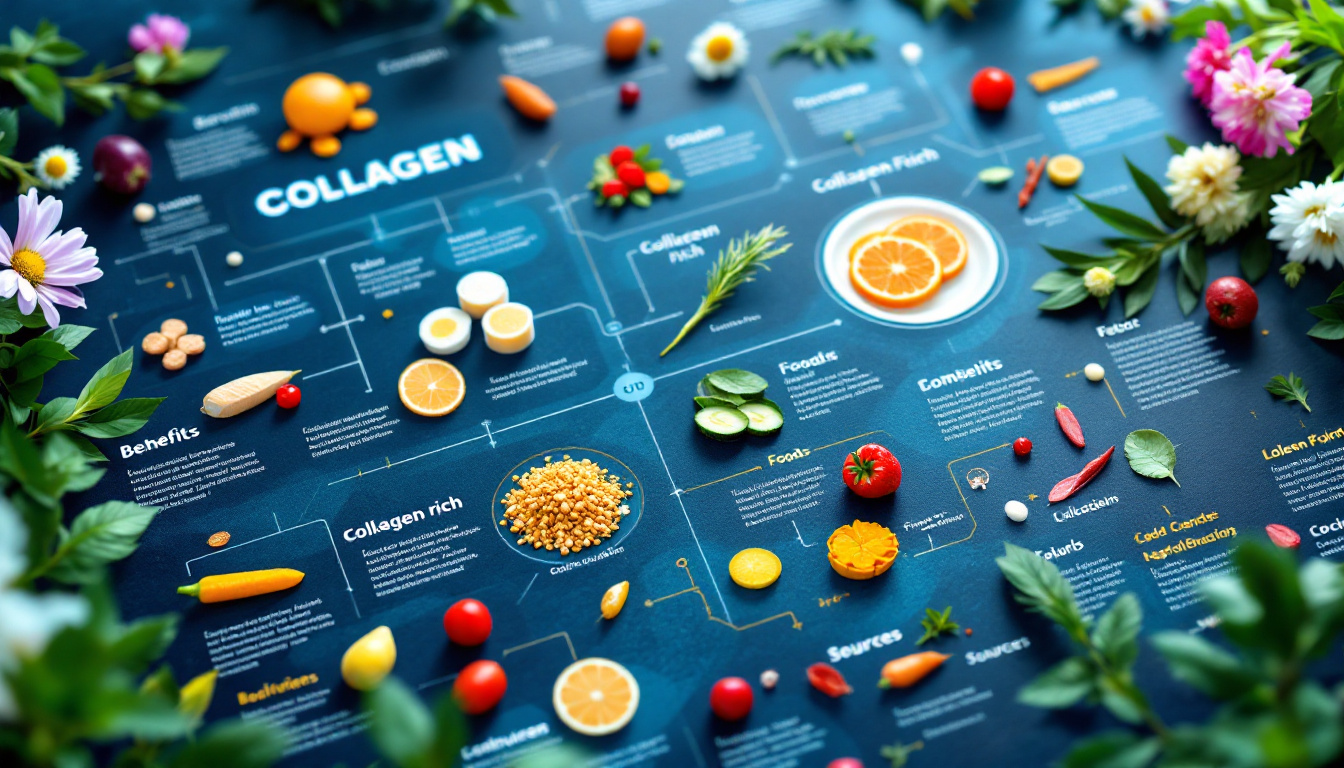As we age, our bodies undergo many changes, including a decrease in collagen production. This protein is vital for various bodily functions, and understanding its importance can significantly impact the health and well-being of seniors. This guide will explore what collagen is, its benefits for older adults, and how to incorporate it into a healthy diet.
Understanding Collagen and Its Importance
Collagen is the most abundant protein in the human body, making up about 30% of its total protein content. It serves as a building block for our skin, bones, muscles, tendons, and ligaments. Given its structural role, it acts like a scaffolding, providing strength and support to these tissues.

What is Collagen?
Collagen is a complex protein that forms the basis for connective tissues throughout your body. When discussing collagen, it’s essential to note its various types and their respective functions. The most common types include Type I, II, and III, each playing distinct roles in maintaining health. Type I collagen, for instance, is primarily found in skin, tendons, and bones, while Type II is mainly found in cartilage, providing cushioning to joints. Type III collagen is often present alongside Type I in the skin and blood vessels, contributing to their elasticity and firmness.
As a fibrous protein, collagen provides tensile strength and elasticity, which helps in the natural healing process. It is also crucial in the formation of new tissues during wound healing. Understanding its multifaceted role is essential for appreciating its health benefits, particularly for seniors. Moreover, collagen's ability to retain moisture in the skin is vital for maintaining a youthful appearance, as it helps to prevent dryness and sagging.
Role of Collagen in the Human Body
Collagen plays several critical roles in maintaining our overall health. Beyond providing structural support, it also contributes to skin hydration, muscle function, and the proper functioning of joints. Seniors may notice that the decline in collagen production affects these areas, leading to wrinkles, stiff joints, and reduced muscle mass. In addition, collagen is involved in the health of blood vessels, helping to maintain their integrity and flexibility, which is essential for proper circulation.
By supporting the structure of these tissues, collagen helps in the maintenance of mobility and flexibility, which are critical aspects of an active lifestyle for seniors. As such, maintaining adequate collagen levels can be a pivotal factor in promoting quality of life. Furthermore, research has shown that collagen supplementation may improve joint health, reduce pain, and enhance physical performance, making it a valuable addition to the diets of those looking to stay active as they age.
How Collagen Production Changes with Age
Unfortunately, collagen production begins to decline around the age of 25, and this decline accelerates in the later years of life. By the time seniors reach their 60s and beyond, collagen levels can be significantly decreased, which can result in various health issues. This reduction can manifest as thinning skin, increased joint pain, or a decline in muscle strength. Recognizing these changes can lead seniors to take proactive steps to bolster their collagen levels and mitigate these effects. Lifestyle factors such as smoking, excessive sun exposure, and poor nutrition can further exacerbate collagen loss, making it even more critical to adopt healthy habits.
In addition to lifestyle changes, there are various dietary sources of collagen that can help replenish the body’s supply. Foods rich in vitamin C, such as citrus fruits and leafy greens, play a vital role in collagen synthesis, as they aid in the conversion of amino acids into collagen. Bone broth, fish, and chicken skin are also excellent sources of collagen, and incorporating these into the diet can provide the necessary building blocks to support collagen production. For those who may struggle to get enough collagen through food alone, collagen peptides or supplements can be an effective alternative, offering a convenient way to support the body’s collagen needs.
The Health Benefits of Collagen for Seniors
Embracing collagen as part of a senior's nutritional regimen can yield numerous health benefits. These advantages range from improving physical appearance to enhancing overall wellness. Below, we delve into some of the most impactful benefits of collagen for seniors.

Boosting Skin Health
One of the most celebrated benefits of collagen is its ability to enhance skin health. With aging, skin loses collagen, leading to wrinkles, dryness, and sagging. By replenishing collagen, seniors can promote skin elasticity and hydration, resulting in a more youthful appearance.
Regularly consuming collagen or collagen-stimulating nutrients may help reduce the visibility of signs of aging. The increased elasticity also lessens the risk of developing skin injuries and aids in quicker recovery post-injury. Furthermore, collagen can assist in maintaining a healthy skin barrier, which is crucial for protecting against environmental pollutants and harmful bacteria. This protective function is particularly beneficial for seniors, as their skin may become thinner and more susceptible to damage over time.
Strengthening Joints and Bones
Collagen plays a significant role in joint health by serving as a lubricant and cushion for joints and cartilage. Many seniors suffer from arthritis or joint pain, which can heavily impact mobility. Supplementing with collagen may enhance joint function and reduce pain associated with such conditions.
Moreover, collagen is also instrumental in bone density. As collagen levels decrease, bone strength declines, which increases the risk of fractures—something particularly concerning for seniors. By supporting bone health, collagen can promote a more active lifestyle. Additionally, collagen supplementation may help in the regeneration of cartilage, which is vital for maintaining joint integrity and function. This regenerative capability can lead to improved physical activity levels, allowing seniors to engage more fully in their daily lives.
Improving Digestive Health
Collagen also supports gut health by strengthening the intestinal walls, which helps to prevent conditions such as leaky gut syndrome. Seniors are often at risk for digestive issues, and maintaining a healthy gut can improve nutrient absorption and overall health.
Incorporating collagen-rich foods or supplements into their diet can aid in digestion, potentially reducing bloating and discomfort. This benefit can encourage more consistent eating habits, leading to better overall nutrition. Additionally, collagen may promote the growth of beneficial gut bacteria, which can enhance digestion and support the immune system. A healthy gut microbiome is essential for seniors, as it plays a crucial role in nutrient metabolism and can influence inflammation levels throughout the body.
Enhancing Heart Health
Heart health is another area where collagen makes a difference. Collagen is a major component of blood vessels. By ensuring that blood vessels are strong and flexible, collagen can help maintain healthy circulation and prevent cardiovascular problems.
With age, stiffening arteries can become a concern for seniors. Collagen can support cardiovascular functionality, contributing to a healthier heart, which is paramount for longevity and quality of life. Furthermore, collagen may help in regulating cholesterol levels by maintaining the structural integrity of blood vessels, which can prevent issues such as atherosclerosis. A strong cardiovascular system not only supports overall health but also enhances energy levels, allowing seniors to remain active and engaged in their communities.
Different Types of Collagen and Their Benefits
Understanding the various types of collagen can help seniors make informed choices about their supplementation and dietary intake. Each type serves different purposes, which may cater to specific health needs.

Type I Collagen
Type I collagen is the most abundant form and is primarily found in skin, tendons, ligaments, and bones. Because of its strength and structure, it is excellent for enhancing skin elasticity and promoting bone health, making it particularly beneficial for aging adults.
Those looking to improve their skin's appearance should prioritize sources of Type I collagen in their diets, as it directly supports skin vitality and integrity.
Type II Collagen
Type II collagen is predominantly found in cartilage. It plays a critical role in joint health, making it ideal for seniors who suffer from arthritis or joint discomfort. This type of collagen can help alleviate pain and promote better joint mobility.
Supplementation with Type II collagen is often recommended for those seeking relief from joint-related issues, particularly as part of a comprehensive health approach for seniors.
Type III Collagen
Type III collagen works alongside Type I to support skin, blood vessels, and organs. It’s especially relevant for seniors looking to improve skin elasticity and vascular health. Like Type I, Type III is beneficial for promoting a youthful appearance and maintaining tissue health.
Incorporating Type III collagen can enhance the overall effectiveness of a health regimen focused on aging well.
How to Incorporate Collagen into a Senior's Diet
Incorporating collagen into a senior’s diet can be achieved through various methods. Whether through food sources or supplements, there are accessible ways to enhance collagen intake.
Collagen-Rich Foods
To boost collagen levels naturally, seniors should consider including collagen-rich foods in their diets. Sources include:
- Bone broth
- Chicken skin
- Fish and shellfish
- Eggs
- Leafy greens and berries
Incorporating these foods can be a delicious way to improve collagen levels while enjoying varied and nutrient-dense meals.
Collagen Supplements
For those who may not get enough collagen through their diet, supplements are an effective alternative. Available in powders, capsules, and liquid forms, collagen supplements are easy to use and can be added to smoothies, soups, or beverages.
When selecting collagen supplements, seniors should look for high-quality products that contain minimal fillers and additives, ensuring they receive the best nutritional benefit.
Tips for Choosing High-Quality Collagen Products
To choose high-quality collagen products, seniors can follow these tips:
- Check for third-party testing, ensuring safety and quality.
- Look for collagen sourced from reputable sources, ideally grass-fed or wild-caught.
- Read reviews to gauge product effectiveness.
- Consult with a healthcare professional before starting any new supplement.
Taking these steps helps ensure that seniors benefit from their collagen intake effectively and safely. By understanding the nutritional aspects of collagen, seniors can make informed decisions for their health.
